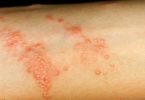What's in this article?
Viral pneumonia Overview
Viral pneumonia is inflammation (irritation and swelling) of the lungs due to infection with a virus.
Pneumonia is a common and very serious disease. According to the World Health Organization (WHO), it is the leading cause of death in children worldwide it kills 1.5million children under the age of five every year (WHO, 2012). Children are not the only age group at risk: pneumonia (combined with the flu often the cause of pneumonia) is the 8th leading cause of death in the U.S. every year (National Center for Health Statistics- 2009).

There are three main types of community-acquired pneumonia: fungal, bacterial or viral. The community-acquired refers to the fact that these types of pneumonia are usually spread from person to person within a community.
In the viral pneumonia the virus invades the lungs causing them to swell and block the flow of oxygen.
Causes of Viral pneumonia
Viral pneumonia are more likely to occur on young children and older adults, because their bodies have a harder time fighting off the virus.
Viral pneumonia are most often caused by one of several viruses:
♦ Adenovirus
♦ Influenza
♦ Parainfluenza
♦ Respiratory syncytial virus
Serious viral pneumonia is more likely to happen in those with a weakened immune system, such as:
♦ Babies who are born too early
♦ Children with heart and lung problems
♦ HIV infection
♦ People have chemotherapy for cancer or other medications that weaken the immune system.
♦ Organ transplant recipients
Symptoms of Viral pneumonia
Symptoms of viral pneumonia were usually begin slowly and may not be severe at first.
The initial common symptoms of viral pneumonia are the same as influenza symptoms:
♦ Cough (with some pneumonias you may cough up mucus or even bloody mucus)
♦ Fever, which may be mild or high
♦ Shaking chills
♦ Shortness of breath (may only occur when you climb stairs)
Other symptoms include:
♦ Confusion, especially in older people
♦ Excessive sweating and clammy skin
♦ Headache
♦ Loss of appetite, low energy, and fatigue
♦ Stabbing chest pain that worse when you breathe deeply or cough
♦ Fatigue
♦ Dry cough
♦ Muscle pain
♦ Weakness.
Within 12 to 36 hours there may increasing breathlessness and the cough will becomes worse and produces a small amount of mucus. There is a high fever and there may be blue-red of the lips.
Treatment of Viral pneumonia
Antibiotics do not treat viral pneumonia. The antiviral medication only works against influenza pneumonia and some causes by the herpes family of viruses.
Treatment may also involve:
♦ Corticosteroid medicines
♦ Increased fluids
♦ Oxygen
♦ Use of humidified air
A hospital stay is necessary to prevent dehydration and to help with breathing if the infection is serious.
You will be admitted to the hospital if you:
♦ Are older than 60 years or a young child
♦ Are unable to care for yourself at home or are unable to eat nor drink
♦ Have other serious medical problem such as a heart or kidney complication
♦ And if you have been taking antibiotics at home and are not getting better
♦ Have severe symptoms
However, many people can also be treated at home.
You can take these steps at home:
♦ Control your fever with aspirin, nonsteroidal anti-inflammatory drugs (NSAIDs, such as ibuprofen or naproxen) or acetaminophen. “DO NOT” give aspirin to children.
♦ Do not take cough medicines without first talking to your doctor. The cough medicines can make it harder for your body to cough up the extra sputum.
♦ Drink plenty of water to help loosen or bring up phlegm.
♦ Get a lot of rest. Have someone else do household chores.
Viral pneumonia Possible Complications
More serious infections can result in liver failure, respiratory failure and heart failure. In many cases, bacterial infections occur during or just after viral pneumonia, which can lead to more serious forms of pneumonia.
Prevention for Viral pneumonia
Wash your hands always, especially after blowing your nose, going to the bathroom, diapering a baby, and before eating or preparing foods.
Don’t smoke. Tobacco damages your lungs’ ability to ward off infection.
Vaccines may help prevent pneumonia in children, the elderly, and people with diabetes, asthma, emphysema, HIV, cancer, or other chronic conditions.
♦ A drug called palivizumab (Synagis) is given to some children under 24 months old to prevent pneumonia caused by respiratory syncytial virus.
♦ Flu vaccine prevents pneumonia and other problems caused by the influenza virus. Must be given each year to protect against new virus strains.
If your immune system is weak, stay away from crowds. Advice visitors who have a cold to wear a mask.
Read related Aricles :









